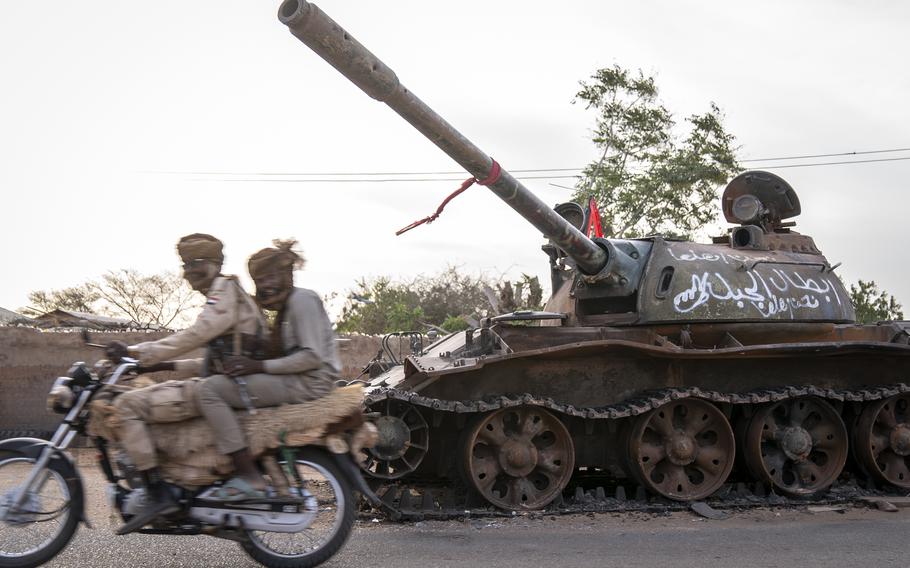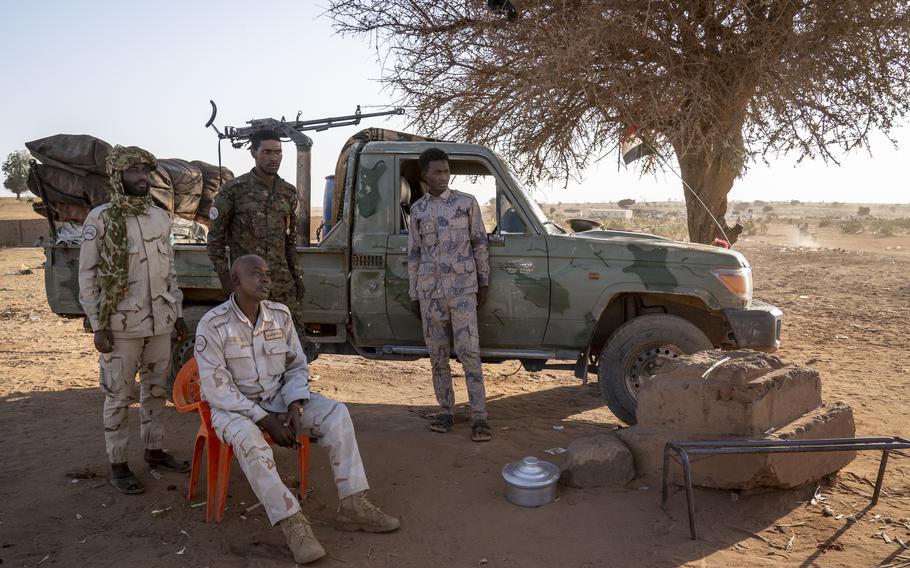Africa
Report spotlights Sudan slaughter, with new city in Darfur under siege
The Washington Post May 9, 2024

RSF soldiers on a motorbike drive by a destroyed tank belonging to the defeated Sudanese armed forces, on a main street in El Geneina, Sudan, on Feb. 20. (Diana Zeyneb Alhindawi for The Washington Post)
NAIROBI — Gunmen spraying bullets at fleeing children; a mother with a child on her back shot dead; terrified teenage girls summarily executed as they fled a massacre in the Darfur city of El Geneina — all deaths meticulously documented in a devastating Human Rights Watch report that may be a grim foreshadowing for the next city under siege in Sudan’s civil war.
The report, released Thursday, is the first comprehensive documentation of the scale of the attacks on El Geneina that culminated in its November capture by Sudan’s Rapid Support Forces (RSF), a paramilitary group now fighting the nation’s armed forces.
Researchers interviewed more than 200 people and drew on visual evidence and satellite imagery to document mass killings and ethnic cleansing of the Black African Masalit tribe. The United Nations has said between 10,000 and 15,000 people were killed by the RSF in El Geneina, a city of around 540,000.
El Fashir, the final regional capital in the western Darfur region still under government control, has now been surrounded by the RSF and fears a similar fate.
“We saw what happened in El Geneina, so we fear dying in a horrific way as well,” said Ahmed Saleh, who has volunteered for a local self-defense group. “We have no choice but to fight because we have nowhere to go if the RSF gets here.”
The people of El Fashir, home to nearly 2 million residents and 800,000 displaced civilians, say the kinds of abuses described in the report are why they are growing increasingly desperate. RSF fighters and allied militias have attacked and burned numerous villages as they encircled the city, and residents say trucks carrying food are stopped from entering unless they pay bribes at checkpoints.
“The whole area around me is on alert, and almost all of the young men carry weapons,” Saleh said. “There is no place for us other than El Fashir. We cannot leave. We can only be buried here.”
The 13-month-old civil war pits Sudan’s military, led by Gen. Abdel Fattah al-Burhan, against the paramilitary RSF and its allied militias. In the vast arid western region of Darfur, regional capitals have fallen one after the other to the RSF, including El Geneina in November.
Survivors who escaped the city told Human Rights Watch researchers that RSF fighters and their allies had fired into columns of fleeing civilians, and one described children and infants ripped from their parents’ arms before the family was slaughtered. Men and boys were especially targeted, and one teenage boy was instructed to slit the throats of his friends.
A senior adviser and delegation member of the RSF, Ezzaddean Elsafi, denied that the group has committed atrocities and said the report contains “huge disinformation and many false news,” notably accounts that his group singled out the Black Masalit tribe.
“There is no discrimination against Masalit tribe. They are currently living peacefully in many cities in west Darfur including El Geneina,” he said. Many people were killed in the city, he said, but they were from multiple ethnic groups, and the RSF “did not target civilians.”

RSF soldiers watch over the border crossing post into Adre, Chad, in West Darfur, Sudan, on Feb. 20. (Diana Zeyneb Alhindawi for The Washington Post)
He also denied that the RSF is taking bribes at checkpoints outside El Fashir.
El Fashir has so far held out while the rest of Darfur has fallen because it is also home to its own powerful, heavily armed ethnically based armed group — many coming from the Black Zaghawa tribe — that fought its own war against the government in the 2000s. For two decades, it battled the military and the allied Janjaweed — an ethnically Arab paramilitary force that later became the RSF and turned on the army — before a 2020 peace deal ended the war. That conflict resulted in accusations of genocide against Sudan’s then-ruler.
The showdown for El Fashir has been looming ever since the former rebels allied themselves with the government against the RSF. To swell the city’s defenses, reinforcements of former rebel fighters have careened down from Libya, where many work as mercenaries, in dust-choked convoys.
“The entire city is under siege,” one member of civil society in El Fashir said. “People are terrified. All the news that is coming across is that El Fashir will be attacked very soon. RSF members have made many videos warning the people of El Fashir that they are coming.” He spoke on the condition of anonymity because RSF forces went after leaders, activists and lawyers in El Geneina, with fighters going house to house with a list of people to target.
“A conflict over El Fashir would be catastrophic for innocent civilians trapped in the city. Many would be killed. Significant bloodshed in El Fashir would likely expand and metastasize the conflict across Darfur and possibly beyond,” said Toby Harward, the United Nations’ deputy humanitarian coordinator for Sudan. “We cannot allow history to repeat itself in Darfur.